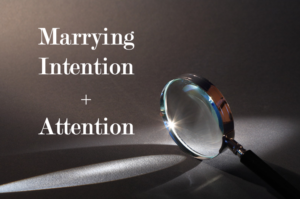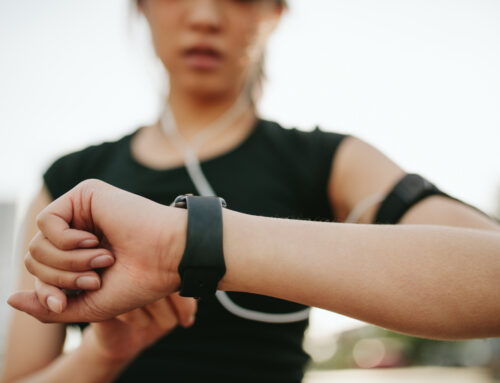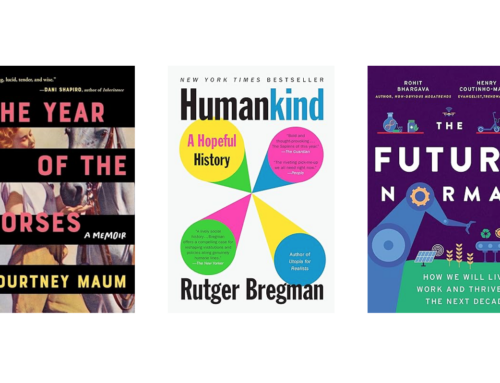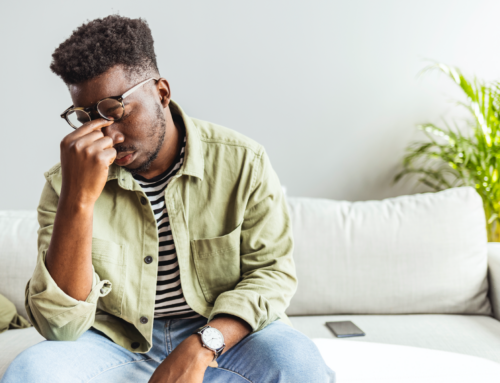OCD acts much like a smartphone. Your phone has lots of apps, some that you want and some (that come pre-loaded on the phone or that a family member downloaded) you don’t. Your mind is filled with thoughts, some you want and some intrusive ones you don’t. Your apps on your smartphone send you notifications when they want attention. In much the same way, OCD reacts negatively to intrusive thoughts when it thinks they’re dangerous, sending you a mental notification to “do something” about the thought. If you then act like what OCD is notifying you about is meaningful, well, then you get lost in the depths of OCD, just like you can get pulled in by a smartphone notification and end up lost in the digital world.
The resulting problem with both is that we’re not present in our real life.
Pick ups, like compulsions, are reinforcing
I recently enabled Screen Time on my phone and learned that I pick up the phone an average of 50 times per day. This is a little lower than the average of 58 times a day quoted in this excellent article from The Guardian, but that doesn’t make me feel much better because I have all notifications on my phone turned off!
Why in the world am I picking up my phone every 20 minutes?
- The phone provides positive reinforcement, meaning sometimes I get rewarded with something positive, like a text from a friend.
- It also provides negative reinforcement, meaning sometimes it takes away negative feelings such as anxiety (what am I missing that I don’t know about?) or boredom (what’s happening in the world that might be more exciting than what I’m doing?).
OCD works entirely on negative reinforcement, meaning we do compulsions because they reduce anxiety. And with either positive or negative reinforcement, the more we get, the more we want.
The slot machine we carry around
Every time I pick up the phone mindlessly, I am giving my brain a little hit of positive or negative reinforcement. Just like every time I react to OCD as if it’s meaningful by doing a physical or mental compulsion, I get a little hit of anxiety relief. With either picking up the phone or doing a compulsion, sometimes I’ll get a big reward, sometimes a little one, and sometimes none at all, but my brain remembers the big payoffs (even though they don’t happen that often), and on the off chance that might happen again, it wants me to repeat the activity. Pick up the phone again! Do that compulsion again!
This is the same type of variable, intermittent reinforcement that slot machines offer, and it’s why they are so hard to stop playing once you get started. Every time I check my phone, I’m reinforcing that I need to do it again in the future. Just like every time I react to OCD as if it’s meaningful, I get some level of anxiety relief that will encourage me to take OCD seriously the next time it complains that I need to do something about that scary intrusive thought.
Is my phone sabotaging my OCD recovery?
So I got to thinking: is my relationship with my phone teaching my brain to react to endless distractions as if they are meaningful? And if so, is that working against all the ERP I’ve done for my OCD? Is it teaching my brain that I should always interrupt whatever I’m doing in the real world to address a distraction, whether it’s my phone or my OCD?
This would be a great research study—does phone use correlate with a greater tendency to do compulsions? Without any data other than my own experience, my hypothesis is that my use of my phone is training my brain to pay attention to distractions more than what I really care about.
Marrying your intentions with your attention
 I’ve written about how being handcuffed to your phone can reinforce OCD, but now I’ve made an additional change to help me marry my intention to focus on what matters to me with my attention:
I’ve written about how being handcuffed to your phone can reinforce OCD, but now I’ve made an additional change to help me marry my intention to focus on what matters to me with my attention:
I ask myself before I pick up my phone, “Why am I picking this up?”
If I don’t have a good answer, I try to leave my phone where it is. Making sure I understand my intention for picking up the phone has helped me reduce my average pick ups to 39 a day. Still not great, but heading in the right direction.
I’ve found that the less I check, the less I want to check, and the less anxious not checking makes me feel. I’m able to focus more on what matters to me, whether that’s a Zoom call with family or friends, or several solid hours of writing, or reading a book without interruptions.
If you feel your phone might be teaching your brain to pay attention to distractions, including notifications from OCD, you might want to ask yourself these questions:
- How often are you picking up your phone and why? For something productive or out of boredom, anxiety, etc…
- How often is your phone preventing you from sustaining attention on what’s important to you?
- How might your life, and your OCD recovery, improve, if you altered your relationship with your phone, so that you were marrying your intention with your attention?
Learn more about taming OCD
Sign up for my Shoulders Back! newsletter to receive OCD-taming tips & resources, including notifications of new blog posts, delivered every month to your inbox.
My blogs are not a replacement for therapy, and I encourage all readers who have obsessive compulsive disorder to find a competent ERP therapist. See the IOCDF treatment provider database for a provider near you. And never give up hope, because you can tame OCD and reclaim your life!
Original image © Can Stock Photo / kvkirillov







Excellent article. I plan to make some
changes in my relationship with my phone!
Hi Shahla,
You are an inspiration to me. As a person who has suffered OCD since I was a child, your tips and coping skills have helped me endlessly. I just want to say thank you for all that you are doing to help people with OCD.